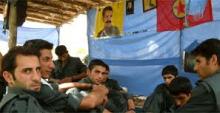National liberation and the formation of new nations has never been a specific task of the proletariat. If in the nineteenth century revolutionaries gave their support to certain national liberation movements, they did not have any illusions that these were anything but bourgeois movements; neither did they give their support in the name of ‘the rights of nations to self determination’. They supported such movements because in the ascendant phase of capitalism the nation represented the most appropriate framework for the development of capitalism, and the establishment of new nation states, by eliminating the constricting vestiges of pre-capitalist social relations, represented a step forward in the development of the productive forces on a world scale and thus in the maturation of the material conditions for socialism. (see note)
As capitalism entered its period of decline, the nation together with capitalist relations of production as a whole, became too narrow for the development of the productive forces. Today in a situation where even the oldest and most powerful countries are incapable of developing, the juridical constitution of new countries does not lead to any real progress. In a world divided up by the imperialist blocs every ‘national liberation’ struggle, far from representing something progressive, can only be a moment in the continuous conflict between rival imperialist blocs in which the workers and peasants, whether voluntarily or forcibly enlisted, only participate as cannon fodder.
Such struggles in no way ‘weaken imperialism’ because they do not challenge it at its roots: in the capitalist relations of production. If they weaken one imperialist bloc it is only to strengthen another; and the new nations set up in such conflicts must themselves become imperialist, because in the epoch of decadence no country, whether large or small, can avoid engaging in imperialist policies.
In the present epoch a ‘successful’ struggle for ‘national liberation’ can only mean a change in imperialist masters for the country concerned; for the workers, especially in the new ‘socialist’ countries, it means an intensification, a systematisation, a militarisation of exploitation by the statified capital which - because it is an expression of the barbarism of the system - proceeds to transform the ‘liberated’ nation into a concentration camp. Contrary to what some people claim, these struggles do not provide the proletariat of the Third World with a springboard for class struggle. By mobilising the workers behind the national capital in the name of ‘patriotic’ mystifications, these struggles always act as a barrier to the proletarian struggle which is often extremely bitter in such countries. Over the last fifty years history has amply shown, contrary to the assertions of the Communist International, that ‘national liberation’ struggles do not serve as an impetus to the struggle either of the workers in the advanced countries or of the workers in the backward the workers in the backward countries. Neither have anything to gain from such struggles, nor any camp to choose. In these conflicts the only revolutionary slogan against this latter-day version of ‘national defence’ dressed up as so-called ‘national liberation’, is the one revolutionaries took up during World War I: revolutionary defeatism, "turn the imperialist war into a civil war". Any position of ‘unconditional’ or ‘critical’ support for these struggles is, whether intentionally or not, similar to the positions of the ‘social chauvinists’ of the First World War. It is thus totally incompatible with coherent communist activity.







